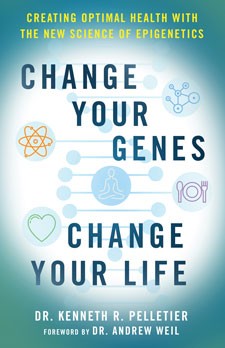
How does epigenetics compare to genetics?
Most medical professionals think of genetics as the hard drive in a computer; it gives commands to your genes. The science of epigenetics is above, beyond and over the gene. I like to describe it as an artificial intelligence, not a hard drive. It’s a newly evolving science of the understanding of how we interact with our genes and how lifestyle biomarkers—for example, diet, stress, pharmacology and environment—can influence the expression of a gene for optimal health and longevity. My hope with this book is that individuals will realize we are not victims of our genetic code; we are, in fact, masters of our fate.
You use the analogy of a theatrical script to illustrate how epigenetic regulation (influencing our genes) works. Please explain.
The gene is like Shakespeare’s play Hamlet: the plot, the play, the writing…that is invariant. But a gene’s expression is governed by what we do every day. Hamlet has been performed by numerous actors, which makes each version of the play different. The underlying script never changes, but the expression does. A gene is fixed, but its expression and epigenetic modifications are like a play that comes out looking different each time, though the script is the same. The human body has the ability to reprogram its genetic expression through lifestyle choices, and we are opening the door to a new era of personalized medicine.
Please further explain “personalized medicine.” How does it tie with our ability to influence our genes for the better?
In today’s world, we are bombarded by contradictory recommendations for diets—low-fat, ketogenic, paleo—how to manage stress, and prescriptions for exercise and training. We are given all these directives about health, but we don’t know our own genetic makeup and whether any of these would be a good match. With personalized medicine, when you take a closer look at your genetics, blood and biome to get a better picture of who you are, you are better able to select particular recommendations to improve your health and longevity.
How can people learn about the current status of their genes?
Several companies do various forms of gene analysis via blood test. The problem today is that results are statistical, meaning you could have an 80 percent chance of IBS, a 60 percent chance of heart disease. But this doesn’t tell you much, because statistics mean probabilities, not you. The more interesting question is who doesn’t have these issues? Within the next year or two, there will be an assay for your gene, blood and biome, which will provide a predictive, accurate personalized medicine profile.
What are three things our readers could work on to change their genetic expression for the better?
First, consume a Mediterranean diet, with an emphasis on fish, fresh vegetables, fruits, olive oil, moderate alcohol consumption (especially red wine) and healthy fats. Second, develop a meditation and/or stress-management practice. It can be as little as 3 to 15 minutes per day; regular practice makes the difference. Third, increase daily physical activity. It can be walking, gardening, yoga or any other regular, fun activity that keeps you moving and flexible.

